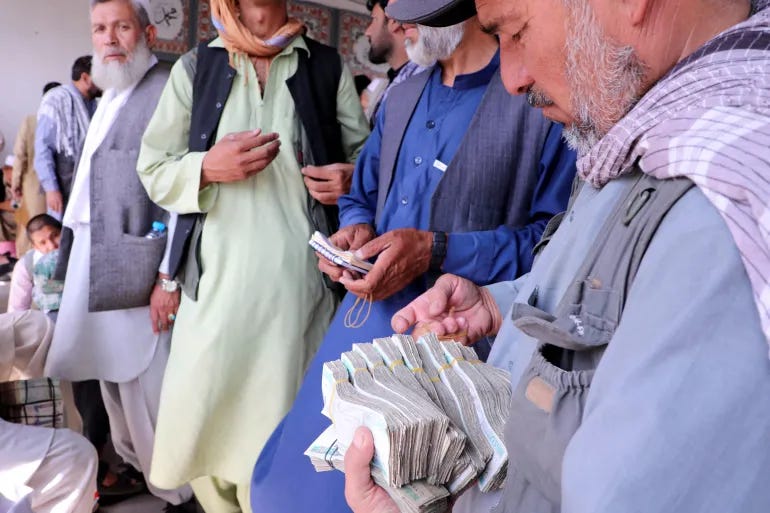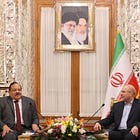Iran-Taliban Banking Agreement: Toward an Axis of Dedollarisation?
Trump's 'maximum pressure' campaign against Tehran is accelerating financial integration among the AoR and could be the push BRICS needs to accelerate dedollarisation.
On Thursday, the Central Bank of Iran announced that the Islamic Republic and the Taliban had reached an agreement to strengthen cooperation in the banking and financial sectors, with the aim of boosting bilateral trade. Although Iran does not formally recognise the Taliban, the agreement represents a strategic move that will help both isolated countries evade sanctions. As Tehran braces another ‘maximum pressure’ campaign courtesy of US President Trump, Afghanistan appears an obvious candidate for dedollarisation efforts. If successful, it could serve as a potential harbinger for Afghanistan’s integration into the Axis of Resistance (AoR), providing Iran with another key outpost for a forthcoming regional war. It may also be a step towards the Taliban's BRICS ambitions.
Iran in the Taliban’s Post-War Economy
Though tense and complicated at times, the Iran-Taliban relationship has generally been friendly. It flourished after the American invasion, which served to bring the two together, with Tehran consistently arming and funding the group throughout the 20-year conflict. Later, the US defeat in Afghanistan was celebrated in Iran as a win for the AoR, boosting morale for allies throughout the region. However, it left the country in urgent need of support, burdened by a continuously depreciating currency and threatened by a humanitarian crisis.
As the Taliban sought to recover and strengthen its post-war economy, several countries promptly stepped up. China was quick to increase ties with the Taliban after the defeat, and in October, announced that it would offer Afghanistan “zero percent tariffs for 100 percent tariff lines,” meaning all Afghan products would enjoy cheap exportation to China. Iran, too, worked to develop this relationship with its neighbour; Iran is Afghanistan’s largest trading partner, and the latter is currently the sixth-largest importer of Iranian goods. These efforts appear to have intensified recently, as earlier this month, the Iranian foreign minister made the first official visit to Afghanistan since 2017. The milestone came after a meeting between the Iranian Ambassador and the head of Afghanistan’s central bank discussing developing trade through banking collaboration, with a focus on electronic banking.
As such, last week’s agreement appears to be the fruit of that meeting. It aims to boost the countries’ trade relationship, which, at a volume of $4 billion, is currently at a two-decade high. Although the specifics have not been disclosed, the agreement is understood to involve integrating financial systems, reflecting past Russian-Iranian sanctions circumvention efforts.
Iran has much to gain from increased relations with the Taliban government. In addition to boosted trade, the country is home to around 3.5 million Afghan refugees, and it has previously expressed hopes of repatriating them. Moreover, with Washington’s sanctions looming, Tehran is in urgent need of diversifying and expanding its economic partnerships.
Trump: The ‘BRICS Pay’ Accelerator
Afghan-Iranian financial integration will provide economic relief from the debilitating financial isolation they have been enduring. Not only that, it is set to expand with increased US pressure on Tehran and could culminate in the granting of the Taliban’s broader ambitions. The Afghan government has previously expressed interest in joining China-led economic projects like the Belt and Road Initiative (BRI), the China-Pakistan Economic Corridor, and even requested to join the BRICS Economic Forum in Kazan. Although their request was not approved and the group did not attend, it is possible that an increasingly isolated China and Iran could vouch for the group's future integration into the bloc. As with the invasion, it appears US aggression is once again bringing Iran and Afghanistan together, but this time sending them off to a stronger BRICS.





